Dear Reader, in this age of AI created content, please support with your goodwill someone who works harder to provide the human-made. Sign up at the top of the lefthand column or bottom of this page. You will receive my hand illustrated monthly newsletter RESTORE NATURE and access to the biodiversity garden design course as I write...and nothing else, I respect your time. I am also removing the advertizing as best I can as its become intrusive inappropriate and pays me nothing.
Pest or blessed ?
What are the benefits of snails ?
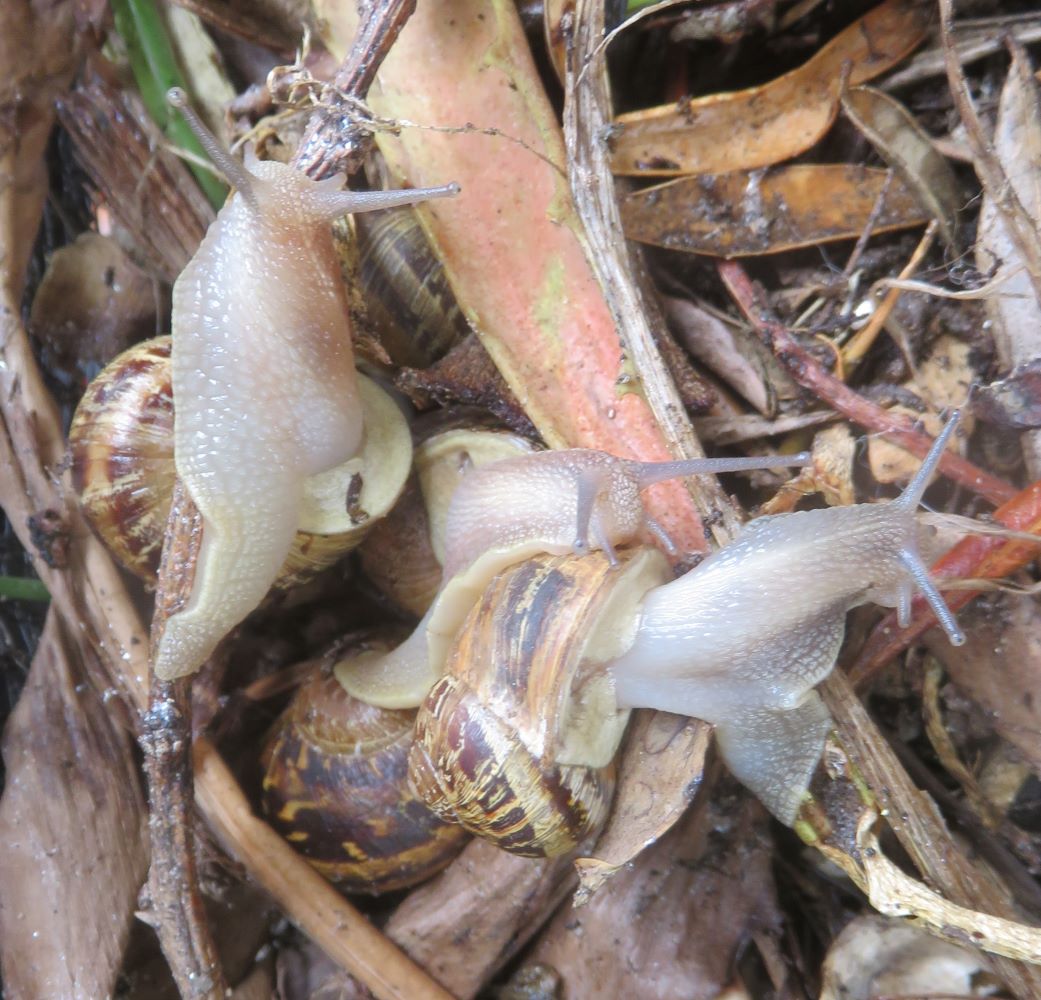 Snails in a snail farm
Snails in a snail farmWhat are the benefits of snails ? Surely they are only a menace and deserve to be stomped on ? Yet there they are in almost every garden. They must serve some purpose !
This series of articles on snails was stimulated by frustration with the enormous snail population in my garden and the question I asked myself about it. As with so many other aspects of gardening, was I engaging in wrong thinking trying to 'get rid' of some irritation, before I had explored what this thing may be doing to help me ?
Take for example 'weeds' and 'insects'. By now we all know that using biocides in the garden to get rid of them is doing more harm than good, that many weeds and insects are beneficial, and so forth. But we need to learn and self educate to realize this. I decided to apply the same inquiry to snails, to discover the benefits of snails.
I found three useful answers : Firstly, like earthworms, they are active soil builders, secondly they are useful indicators of ecosystem health and last but not least, in a wildlife garden they are useful as food for other animals higher up the food chain, supporting a wide diversity of creatures in your garden.
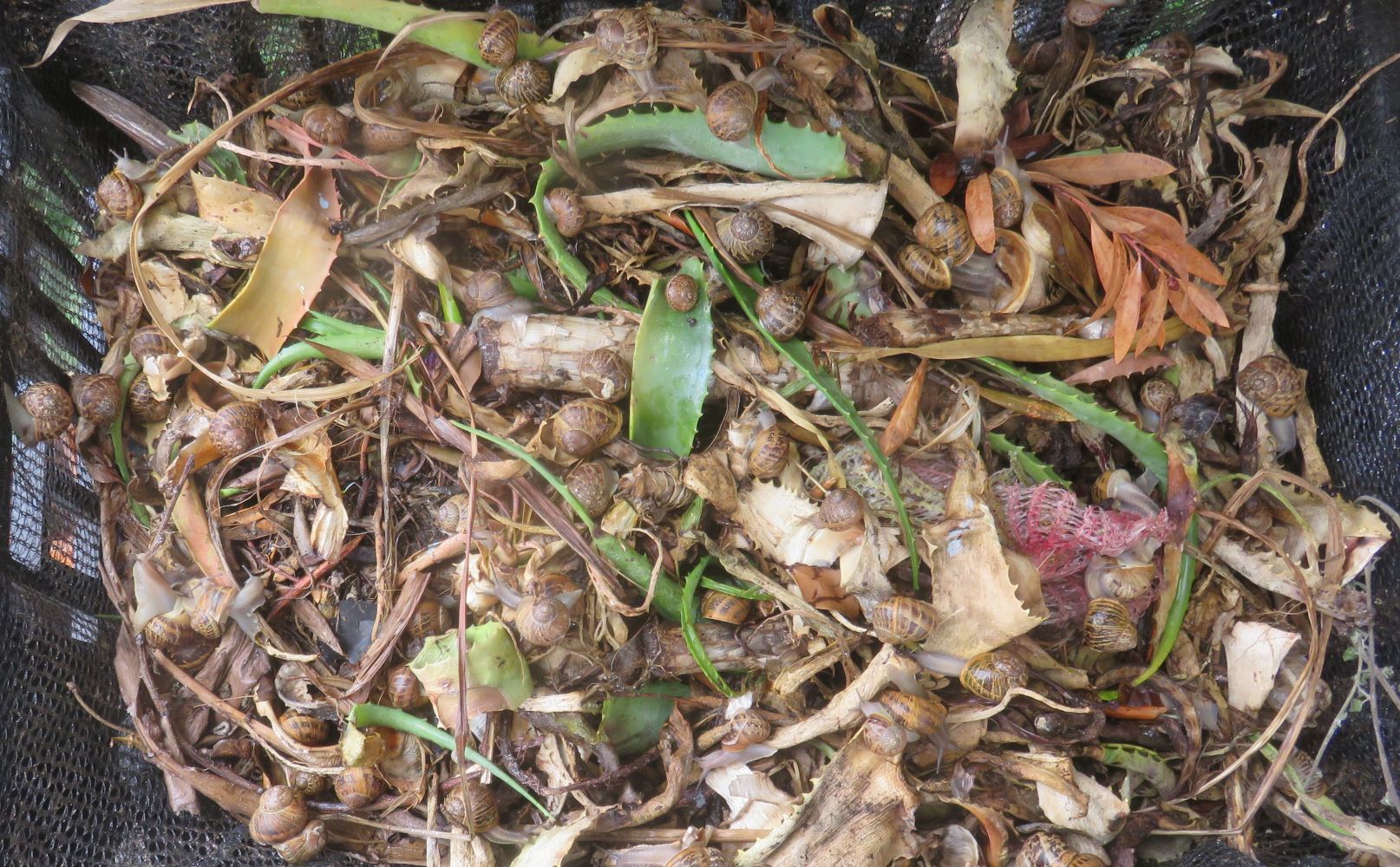 Harnessing the benefits of snails in a snail farm.
Harnessing the benefits of snails in a snail farm.The benefits of snails to soil
If you google 'worms and soil' you will find 24 million results on how worms benefit your soil. Google 'snails and soil' and you will find 15 million results on how to get rid of snails and no mention of their good work.
BUT
Snails are doing up to 33% of the decomposition of organic matter in the garden. They are building soil structure and dispersing soil organisms. Their feces make a mineral and nitrogen rich contribution to the soil, say some authors.
Studies on the benefits of snails
In one case study, worms increased soil phosphates and the root nodulation and cover of Trifolium dubium, a nitrogen fixing clover, by suppressing grasses and Asteraceae through burying the seeds. Compared to worms, foraging snails increased plant litter while they decreased the Trifolium cover, therefore reducing soil nitrogen. This effect of reducing nitrogen compared to worms may only be due to them working against a nitrogen fixing plant, rather than somehow removing nitrogen from the soil, because they are known to add nitrogen.
In the Negev desert where soil nitrogen is very low, snails were important in the nitrogen cycle. Snails feeding on lichens that penetrate rocks (endolithic lichens) ingest rock and lichen and their faeces contribute 22-27mg N per m2 per year, or 11% of soil nitrogen inputs and 18% of soil creation in this habitat. This is probably important for plant growth.
Snails may be a nuisance to the farmer, but a study on snail populations revealed that their number in agricultural soils is actually low. In tilled soil there is decreased food and moisture, and they are exposed to physical disturbance and toxins. The population of snails in woods and grassland is much higher. Thus one more of the benefits of snails is that they are an indicator of ecosystem and soil health.
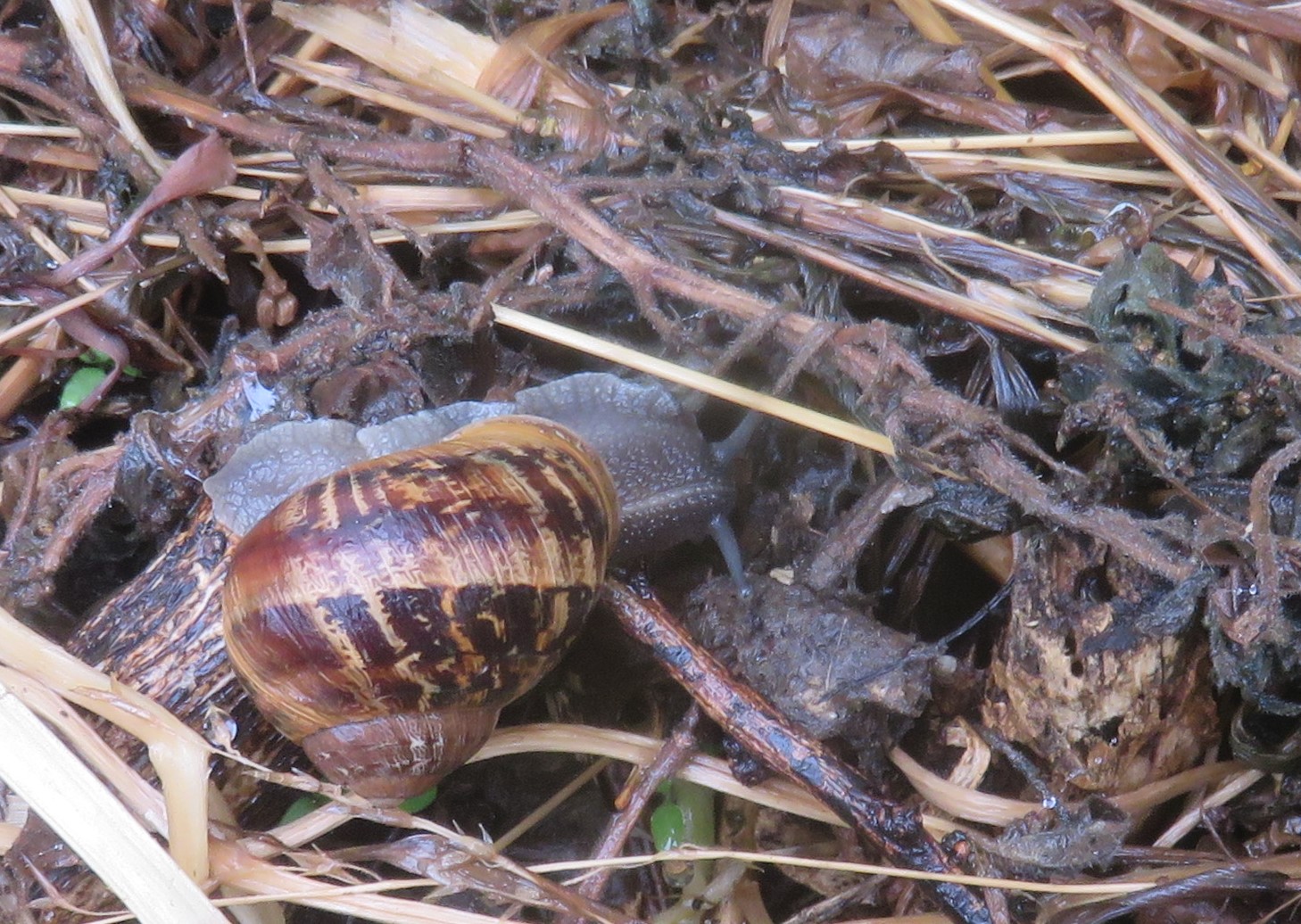 This snail was found eating decomposed black sludge
This snail was found eating decomposed black sludge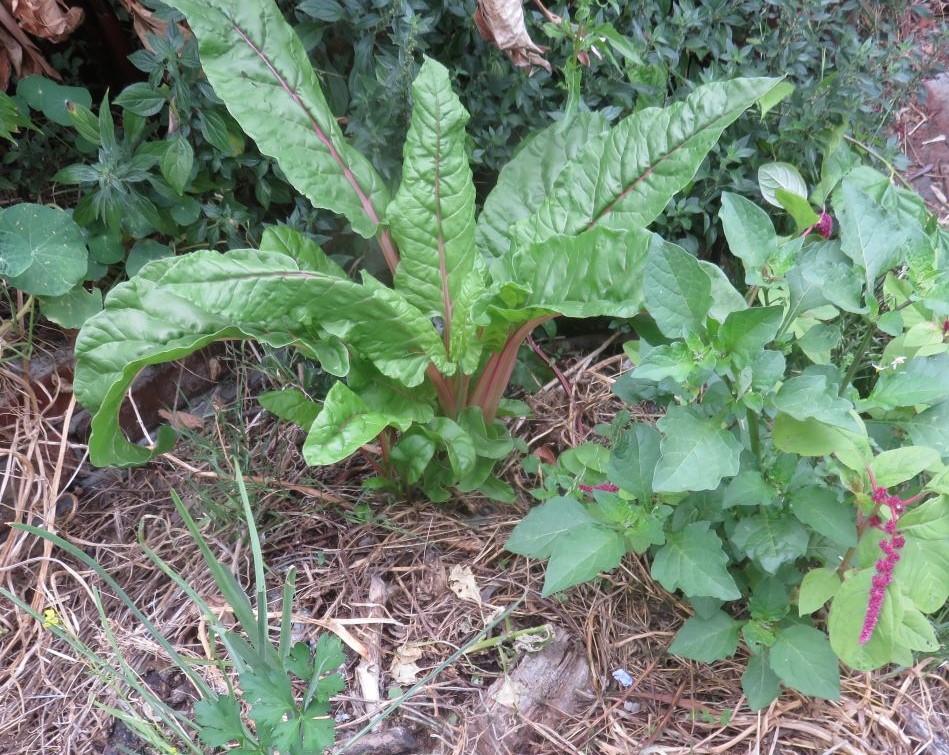 The snail was eating the sludge close to the pale forked twig, eight inches from a large untouched two year old chard plant
The snail was eating the sludge close to the pale forked twig, eight inches from a large untouched two year old chard plantSnails prefer brown to green
......mostly
I can confirm with personal observation the research that snails thrive in forests and are indicators of soil health. In my food forest garden there is a massive snail population. Growing juicy greens as a ground cover doesn't work too well. I'm forced to build raised beds isolated from the forest for my European vegetables.
We notice snails eating our garden plants, but take a closer look and you will see that almost all common garden snails and slugs actually prefer dead and decaying plant detritus. The more you remove dead plant matter to clean up your garden beds, the more likely they are to go for your lettuces.
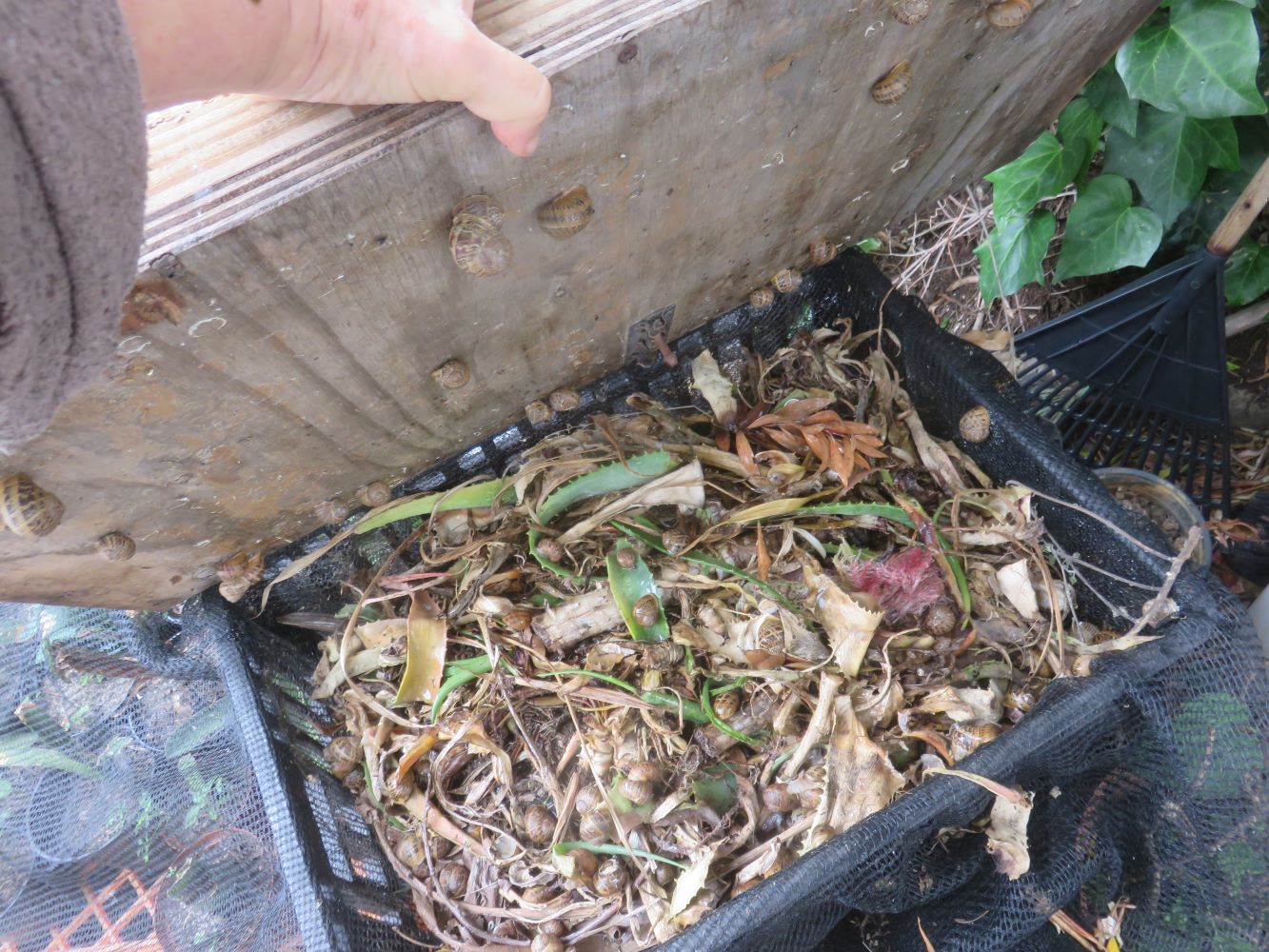 A snail farm can be as simple as you wish. These are confined by a heavy lid and fine mesh.
A snail farm can be as simple as you wish. These are confined by a heavy lid and fine mesh.The benefits of snails and snail manure !
To provide balanced nutrition in my vegetable beds, one of the sources of manure will be snail manure. I harvest all the snails I find and put them in a farm or container cage, on netting, there they can eat to their hearts' content on garden waste I've chosen to feed them, and I can harvest their feces as they fall down through the netting. But the control of the situation is an illusion of course. Gastropods rule, and every gardener knows it ! However, it helps to make friends with that, to know of the good they do, and how to tweak your system to lessen the damage.
------
------
The introduction to the snail story and links to the other snail articles

Restore Nature Newsletter
I've been writing for four years now and I would love to hear from you
Please let me know if you have any questions, comments or stories to share on gardening, permaculture, regenerative agriculture, food forests, natural gardening, do nothing gardening, observations about pests and diseases, foraging, dealing with and using weeds constructively, composting and going offgrid.
What Other Visitors Have Said
Click below to see contributions from other visitors to this page...
German snails Not rated yet
Here is a lovely video on the diversity of snail species found in Austria. Explained in broad dialect, I managed to get the nuggets. Indigenous snails …
SEARCH
Order the Kindle E-book for the SPECIAL PRICE of only
Prices valid till 30.09.2023
Recent Articles
-
garden for life is a blog about saving the earth one garden at a time
Apr 18, 25 01:18 PM
The garden for life blog has short articles on gardening for biodiversity with native plants and regenerating soil for climate amelioration and nutritious food -
Cape Flats Sand Fynbos, Cape Town's most endangered native vegetation!
Apr 18, 25 10:36 AM
Cape Flats Sand Fynbos, a vegetation type found in the super diverse Cape Fynbos region is threatened by Cape Town's urban development and invasive alien plants -
Geography Research Task
Jan 31, 25 11:37 PM
To whom it may concern My name is Tanyaradzwa Madziwa and I am a matric student at Springfield Convent School. As part of our geography syllabus for this
"How to start a profitable worm business on a shoestring budget
Order a printed copy from "Amazon" at the SPECIAL PRICE of only
or a digital version from the "Kindle" store at the SPECIAL PRICE of only
Prices valid till 30.09.2023







